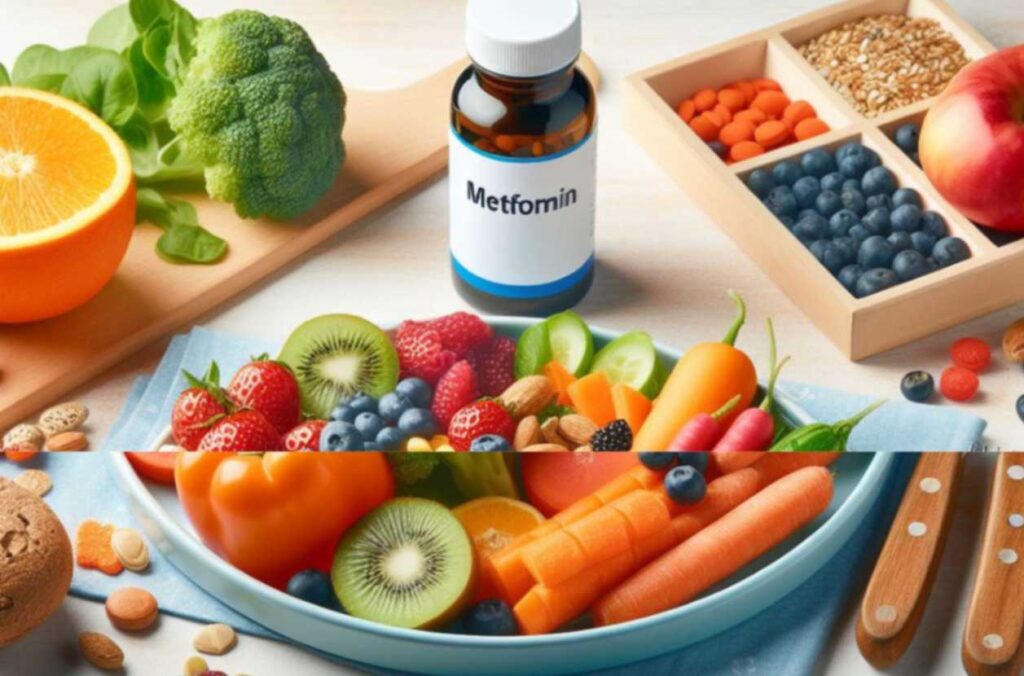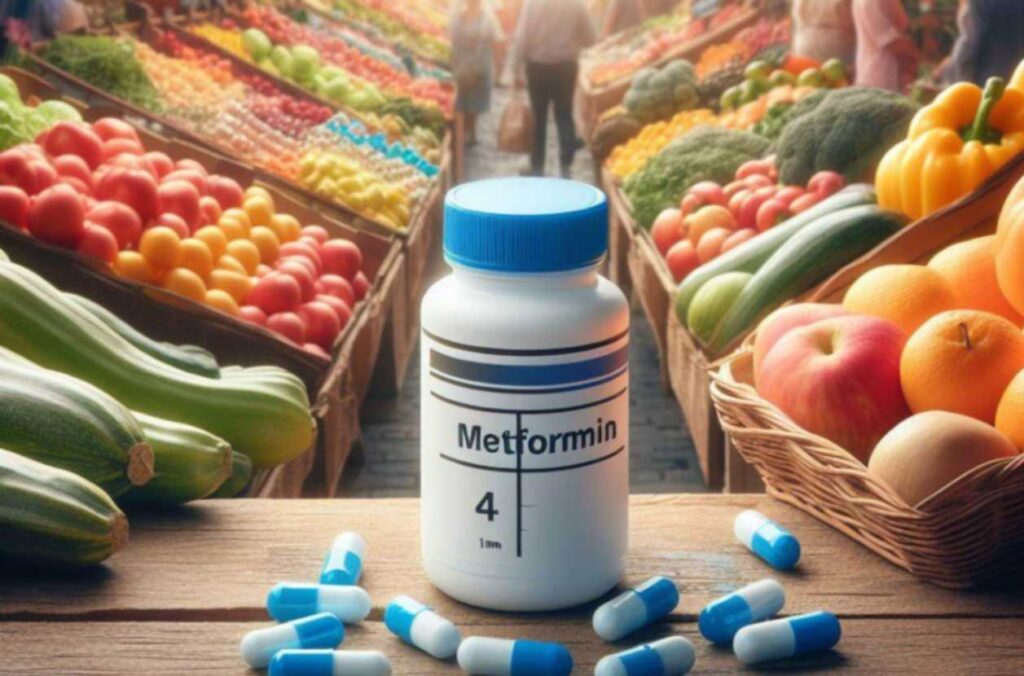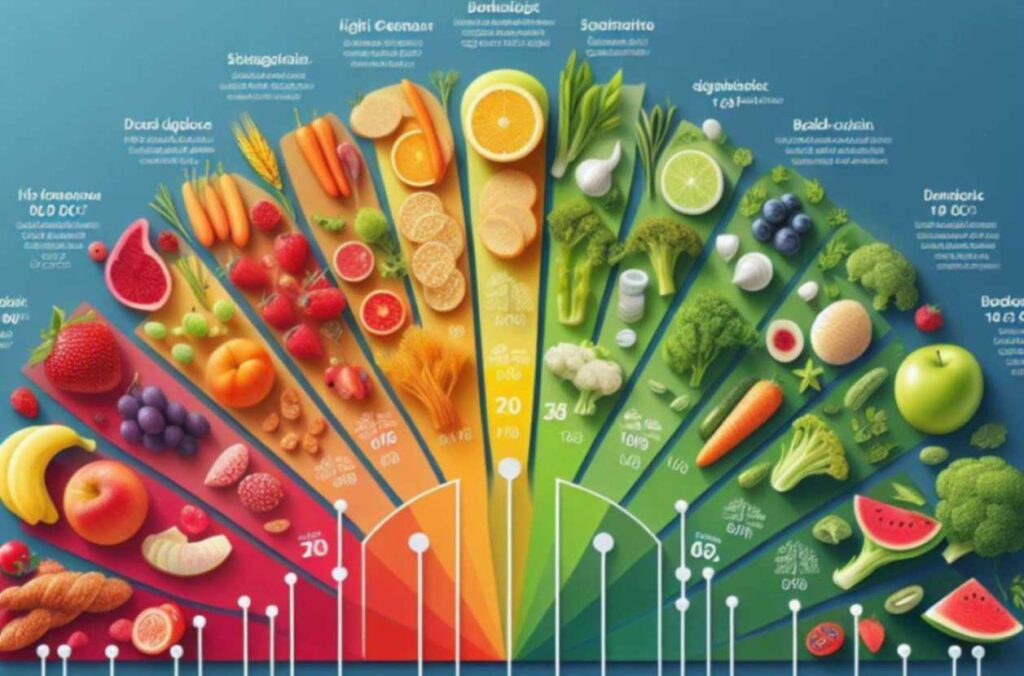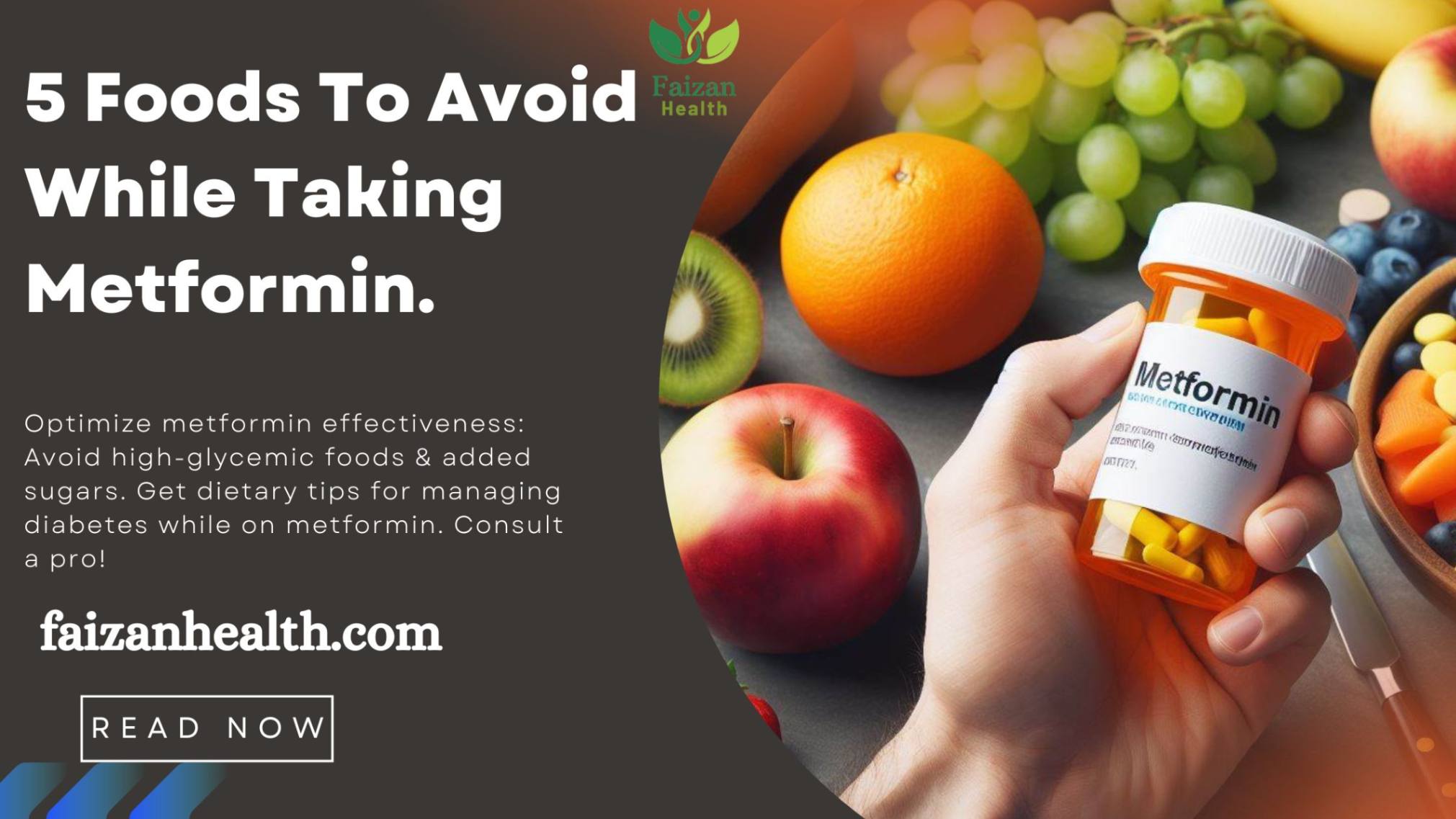Metformin is a commonly given medication that regulates blood sugar levels in people with type 2 diabetes. Although it is quite successful at managing blood glucose levels, what you eat can have an impact on its efficiency. Understanding which meals to avoid while taking metformin is essential for maximizing its advantages and avoiding potential problems. In this article, we’ll explore interactions between metformin and certain foods, giving you the guidance you need to better manage your condition. Let’s review the details to make sure you’re making informed choices for your health.
Glucophage is the Second Name of (Metformin).
1: Interactions between metformin and certain foods:
Metformin, a usually endorsed type 2 diabetic medication may collaborate with specific dinners, decreasing its viability or causing bothersome secondary effects. Understanding these linkages is critical to enhancing your treatment strategy. Here’s a closer look at how some meals can interact with Glucophage.

High Glycemic Index Foods:
- Fast-digesting foods like white bread, white rice, and sugary snacks can impair Glucophage blood sugar control.
- Consuming nutritious grains, legumes, fruits, and vegetables can help keep blood sugar levels constant.
Foods with added sugars:
- Candy, pastries, soda, and sugary liquids can boost blood sugar levels, making Glucophage less effective.
- To fulfill cravings without adding sugar, choose for fresh fruit or unsweetened options.
Alcohol consumption:
- Metformin and alcohol can interact, causing lactic acidosis and low blood sugar.
- If you drink, do it in moderation and monitor your blood glucose levels.
Fiber-rich foods and timing of consumption:
- Fiber is great, but eating high-fiber foods before or after taking Glucophage can interfere with its absorption.
- Reduce your fiber intake and take metformin as directed by your healthcare provider.
2: High-Glycemic Index Foods:
Definition and Examples:
- High glycemic index (GI) foods elevate blood sugar levels soon after consumption.
- Examples include white bread, rice, sugary cereals, and processed snacks.
Effect on blood sugar:
- Consuming high-GI foods can cause blood sugar levels to rapidly rise, followed by a collapse.
- This roller coaster effect might make it challenging to keep blood sugar stable, particularly for diabetics.
Interactions with metformin:
- When used with Glucophage, high-GI meals may offset its blood sugar-lowering effects.
- Metformin works by lowering glucose synthesis in the liver and increasing insulin sensitivity, however high-GI meals can hinder these processes.

3: Foods High in Added Sugars.
Identification of Added Sugars:
- Syrups and sugars added to food and drinks during processing or preparation are known as added sugars.
- Sweetened cereals, cakes, candies, and beverages with added sugar are examples of meals and drinks high in sugar.
Effect on blood sugar:
- Blood sugar levels might rise quickly after consuming foods high in added sugars.
- An inability to efficiently make or use insulin due to these increases can result in poorly controlled blood sugar.
Interactions with metformin:
- Foods containing added sugars may hinder Glucophage ability to reduce blood sugar levels when consumed together.
- Metformin improves insulin sensitivity and lowers the liver’s synthesis of glucose, yet these benefits can be offset by added sugars.
Recommendations:
- Minimize or avoid foods and drinks with added sugars to support the effectiveness of Glucophage.
- Instead, choose natural sources of sweetness like fruit, which provide essential nutrients with their natural sugars.
- To minimize added sugar consumption and encourage improved blood sugar regulation, opt for unsweetened versions of meals and drinks wherever feasible.
4: Alcoholism Consumption:
Interactions with metformin:
- Metformin and alcohol may interact, possibly leading to negative side effects such hypoglycemia or lactic acidosis.
- Alcohol can alter the metabolism of the liver, which is primarily responsible for processing Glucophage, changing the drug’s levels in the blood.
Effect on blood sugar:
- Blood sugar levels can change after drinking alcohol.
- Because alcohol contains carbohydrates, it might initially raise blood sugar levels. Later on, nevertheless, it may result in low blood sugar, particularly in diabetics.
Recommendations:
- When using Glucophage, if you decide to drink, do so in moderation.
- For women, one drink per day and for males, two drinks per day is considered moderate alcohol consumption.
- When consuming alcohol, pay special attention to your blood sugar levels and be aware of the warning signs and symptoms of hypoglycemia, or low blood sugar.
- It’s important to discuss alcohol use with your doctor to find out if it’s appropriate for you in light of your particular medical condition and any other medications you may be taking.

5: Fiber-rich foods and timing of consumption:
Role of fiber in diet:
- Plant-based diets contain fiber, a form of carbohydrate that the body is unable to process.
- It supports sensations of fullness and satiety, helps control blood sugar levels, and is crucial for digestive health.
Impact on Metformin Absorption:
- Prior to taking metformin, eating a high-fiber meal may potentially affect how well the medication is absorbed in the digestive system.
- Fiber slows down the digestion and absorption of nutrients, including medications, which may have an impact on when and how well Glucophage works.
Recommendations:
- Steer clear of high-fiber foods when taking Glucophage to reduce the chance of interactions.
- To optimize absorption, take metformin as directed by your healthcare professional, either before or after a meal.
- Eat an eating routine high in fiber-rich food varieties since they have numerous medical advantages, yet watch when you take metformin to guarantee it fills in as planned.
- Fiber-rich foods include whole grains, beans, nuts, seeds, fruits, and vegetables.
Read More About 4 Best Hypertrophic Cardiomyopathy Self-Care Tips.
Conclusion:
In Conclusion, managing diabetes with metformin involves more than just taking the drug. It also requires careful attention to food choices. Understanding interactions between metformin and certain foods is important to optimize treatment outcomes. By avoiding foods with a high glycemic index and increased intake of added sugars, individuals can better control their blood sugar levels and support the effectiveness of metformin.

Additionally, moderate alcohol consumption and mindful timing of fiber-rich foods can help minimize potential interactions and ensure proper absorption of medications. Ultimately, consulting a health care provider or registered dietitian for personalized dietary guidance is key to effectively managing diabetes while taking metformin. By making informed dietary choices, individuals can maximize the benefits of metformin and take proactive steps toward better health and wellness.
FAQs:
Can I still enjoy sweets while taking metformin?
When taking metformin, it is advised to avoid sweets and foods high in sugar. Pick sugar-free snacks or fresh fruit as healthy substitutes to sate your sweet desire without affecting your blood sugar levels.
Should I adjust my dosage while taking metformin?
Yes, it is advisable to make dose adjustments while on metformin. Avoid items high on the glycemic index and added sugar to maximize its effectiveness. Diabetes can also be managed with a balanced diet that includes lots of fiber-containing foods. For individual counsel, speaking with a physician or dietician is advised.




Can you be more specific about the content of your article? After reading it, I still have some doubts. Hope you can help me.